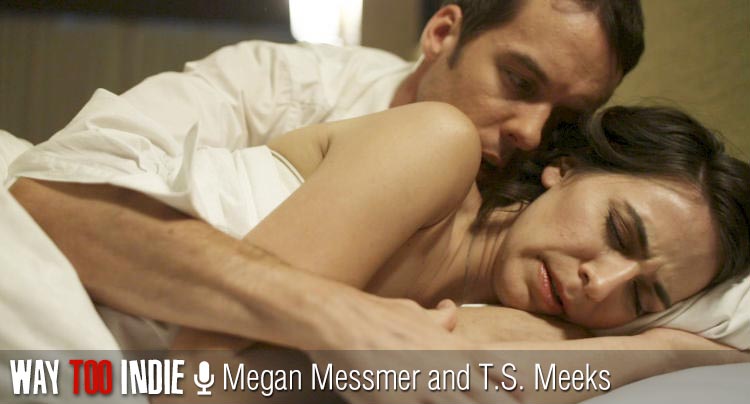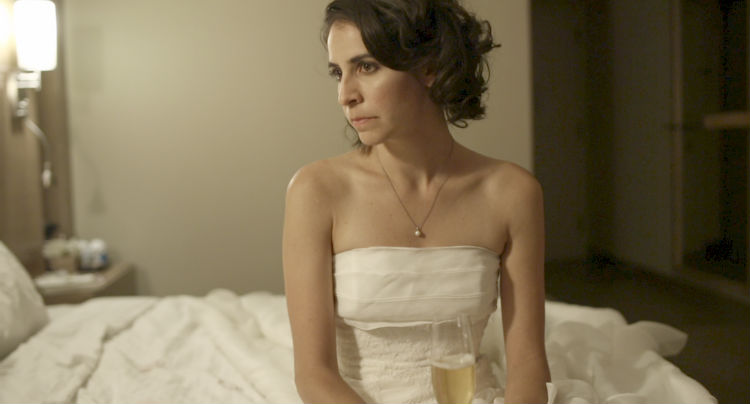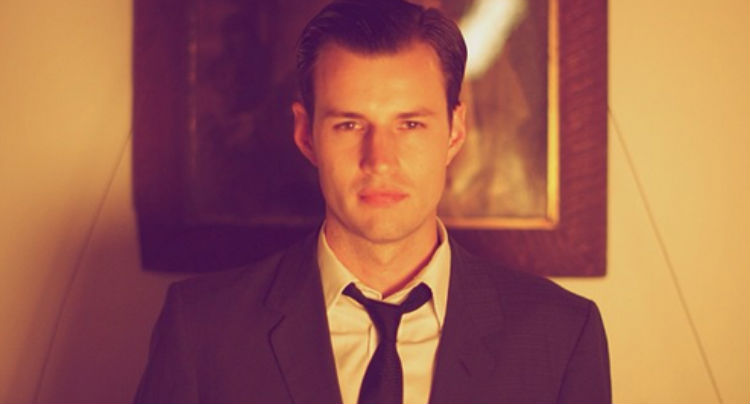Megan Messmer and T.S. Meeks Talk ‘To Us’

To Us, a short film by indie up-and-comer T.S. Meeks, centers on a couple falling away from each other…after only being married less than 24 hours. It’s a crushing, brilliantly acted and scripted mini-drama about the hush after the hoopla, that moment when you and your newly-pronounced spouse escape the noise of the reception, unlock the door to the hotel room, plop onto the big bed, lay in silence, and think, “What have we done, really?”
We spoke to Meeks and star Megan Messmer–who has an improv background including performing at Hollywood’s IO West Theater, the Groundlings, and UCB–in separate phone interviews about screening the film this weekend at the Santa Barbara International Film Festival, Meeks not letting Megan watch the film beforehand, the benefits of an improv background as an actor, and much more.
Check out To Us at the Santa Barbara International Film Festival today at 2pm and on Sunday at 4:40pm. For more details, click here. Also check out: tousfilm.com, meganmessmer.com

The film screens this Sunday at SBIFF, and you haven’t seen it yet. Are you nervous?
Megan: Yes. My director is a romantic and doesn’t want me to see it until Sunday. We’re all going to be there, and I feel like I’m going to be biting my fingernails and looking through my hands the whole time. (laughs) I do a lot of comedy, but indie film is my passion, so I got cast in this, and it’s the first drama I’ve done in years. I feel like watching myself during these really vulnerable moments is going to be…(trails off). I’m going to be like, “OOH! WHAT’S GOING TO HAPPEN!?” You know? I’m nervous. I really am.
You perform improv all the time in front of crowds. Do you get nervous for that?
Megan: No. Not anymore. I’ve been doing improv for 5 years professionally, on a weekly basis. I just go out and have fun. Shooting this movie was really fun for me. Even though it’s a drama, being on set and getting into the character…that’s the stuff that I live for. But I don’t go back and watch my improv shows! This is going to be something special to watch myself going through moments that typically people don’t ever watch themselves go through.
You put forth a really powerful performance here. Very impressive. You’re constantly honing your tools doing improv on a regular basis; talk about how those tools translate to genres other than comedy.
Megan: I surround myself with people who have the same mindset, which is that everything you do as an actor is in the moment. You can’t ever play the same performance twice. My director said something to me that was so humbling and awesome. He said, “You’re a joy to work with because you can do no wrong on camera.” Essentially, he’s saying that in every take, I’m going through something different, you know what I mean? I’m in the truth of the moment. You do that in improv, you do that in comedy, you do that in drama, you do that in life.
I remember I did this comedy with some guys that I work with often. They wrote this role for me, and I remember I was almost in tears in this comedy! I took a step back and thought, I’m almost in tears, and this is supposed to be comedic. The character was a woman who was so upset, angry and hurt, that that’s what she was going through. Comedy, to me, is the most tragic, dramatic thing you can go through.
I feel that over the past ten years, people are really starting to embrace the versatility of comedic actors, putting them in more complex, dramatic roles more often. Do you notice this as well?
Megan: Yes. That’s what I want for my career. I don’t want to be pigeonholed into, “She’s a comedy girl.” That’s great, but there’s so much more to be had. I want to do both. Something interesting that I learned is that, at our highest point emotionally, when we’re ready to break, we break one of two ways: we laugh or we cry. I think that’s so interesting. In serious situations, I’ll find myself laughing and I’m like, this isn’t funny, but I don’t know what else to do right now!
You just recently got married, correct?
Megan: Yes.
How did you mine that experience to inform the role?
Megan: Oh gosh. It was easy for me to get into the space of this film. Before you get married, you go through this range of emotion. “Holy shit…this is forever?” It’s not that you’re thinking he’s the wrong person. It’s just, what does this mean? I don’t know who I’ll be in 5 years, 10 years. You’re making this commitment to this person and hoping that their idea of commitment is the same as yours. It’s scary. This woman finds out something she didn’t know about her husband on the night of their wedding. Suddenly, this person is a completely different person in her eyes. There’s this new information; is he the person that I thought he was?
I’m also recently married, so the story resonated with me as well.
Megan: Congrats!
Congrats to you as well! I really love the natural flow of the dialog in the film. Was it written or improvised?
Megan: It was written. I like to connect with the words of the writer. I really love writers. In the audition, I used all of the words except one. I think he wrote “honey” and I said “babe”, because that’s what I say to my husband. I really connected to the way he wrote this film.

You have a good cry in the film. Is crying on camera easy or hard for you?
Megan: That’s interesting. I think that people can get to a place where they can cry on cue. That’s not what I did. What you saw was me getting to a place where I’m vulnerable and I’m going through those emotions. That’s hard. I think that the really great actors are vulnerable in front of the camera, and that’s hard to do. You’re putting it all out there and you feel exhausted. No one should be next to you when you’re going through that, but I was worried about the camera being right in my face.
Why should people come out to see the film this Sunday in Santa Barbara?
Megan: This is a really special film. T.S. Meeks has such a budding career in front of him that if you want to see a star-in-the-making, this is a film you want to see so that you can say you were there. Also, my mother-in-law is going to be there, and she’s never seen me do anything like this…so that’s going to be fun! You guys should come out and sit next to us to see how that works.
[Hours after my interview with Megan, I gave director T.S. Meeks a call to get his perspective.]
Are you married?
Meeks: I’m not married! That seems to be “the question”. But I can tell you how I was inspired to write the film. I worked in hotels a lot as a bellman, and I would check in a lot of brides and grooms on their honeymoon. There was this strange eerie-ness, like it was just a Tuesday instead of something sacred. I’d leave their room wondering how they got to this moment in time where they’re committed to each other for the rest of their lives. It all seems mundane. I wanted to explore that.
I studied people for many years. I’m not so much interested in the words being said, but more the moments in between moments. The silences in between events. That’s the kind of thing that fascinates me. Most of life is those moments.
You use and value silence a lot in the film, which is a somewhat rare commodity these days.
Meeks: I think what silence does is make the audience uncomfortable and places them in the moment with the characters, in the room. You can feel the textures of the room. Instead of leading the audience with a soundtrack, I’d like to lead them with the sound of the room.
What was it like working with your actors?
Meeks: You talked to Megan earlier, right?
Sure did!
Meeks: She’s amazing to work with. She could do no wrong on camera. Everything was truthful. That’s what we were looking for, the truth between these characters. My job was to create a safe place for them to explore, and they just dove right in. James, the actor, was eager to find what was right for the character, exploring why he was acting the way he was. What I try to do is create a place of trust for all of us, from the DP to the sound guy to the actors, so that each moment is personal.
The third day of shooting, I realized the excitement of the fact that I’m suddenly a leader, I’ve brought all these people together, and I’m making sure that everyone’s on the same page. It was so rewarding, such an awesome experience to have these people around me, supporting me. It’s not my film, it’s our film. There’s no way I could have done it by myself.

ABOVE: T.S. Meeks
When I spoke to Megan, she said that you didn’t want her to see the film until this Sunday.
Meeks: (laughs) Yeah. I kind of wanted us to all share that experience, because no one else has seen it. You’ve seen it (laughs), but as a crew I wanted us all to see it at once. I want a collective experience. Which is unfair, because I’ve seen it with my editor. (laughs) I’m a romantic and prefer that we all watch it together.
How did you achieve the natural-sounding dialog?
Meeks: It was all scripted, but I let them be free in that I wasn’t looking for the line. I was looking for the motivation and the character coming through. It’s never about the words. I was trying to achieve [that natural feel], so it’s awesome that you say that. I wanted it to be like we’re in the room with them, not distant. In a relationship, you’re all over the map, especially when you’ve had all this champagne, you’ve danced, you probably didn’t sleep the night before, and now you’re finally settled in your room, married. You’re probably going to be blissful and tickling, and then you’re going to be upset. A lot of movies dive into marriages ten years down the line like, “How did we get here?” What if they discovered that on the night they got married?
I’ll end with the same question I asked Megan: Why should people come out to see the film this Sunday?
Meeks: Come out to see a movie that will hopefully make you reflect on how you see relationships and marriages. Hopefully my audience will have some self-reflection in a good or negative way. Either way, as long as a conversation gets started.
